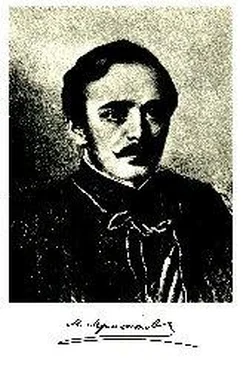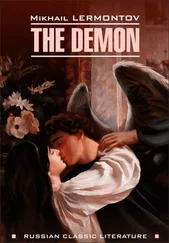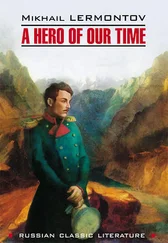"What was his name?" I asked Maksim Maksimich.
"Grigoriy Aleksandrovich Pechorin . A fine man he was, I assure you, though a bit odd. For instance, he would spend days on end hunting in rain or cold-everybody else would be chilled and exhausted, but not he. Yet sometimes a mere draft in his room would be enough for him to declare he had caught cold-a banging shutter might make him jump and turn pale, yet I myself saw him go at a wild boar single-handed. Sometimes you couldn't get a word out of him for hours on end, but when he occasionally did start telling stories you'd split your sides laughing... Yes, sir, a most odd sort of young man he was, and, apparently, rich too, judging by the load of expensive trinkets he had."
"How long was he with you?" I asked.
"Just about a year. But it was a year I won't forget. He caused me plenty of trouble, God forgive him!-though that's not what I remember about him. But after all, there are people who, when they are born, the big book of life has it already written down that all sorts of amazing things will happen to them!"
"Amazing things?" I exclaimed eagerly as I poured him some more tea.
"I'll tell you the story. Some four miles from the fort there lives a loyal prince. His son, a boy of about fifteen, got into the habit of riding over to see us. Not a day passed that he didn't come for one reason or another. Grigoriy Aleksandrovich and I really spoiled him. What a daredevil he was, good at everything: he could pick up a cap from the ground at full gallop, and he was a crack shot. But there was one bad thing about him: he had a terrible weakness for money. Once for a joke Pechorin promised him a gold coin if he stole the best goat from his father's herd, and what do you think? The very next night he dragged the animal in by the horns. Sometimes, if we just tried teasing him, he would flare up and reach for his dagger. 'You'll come to a bad end, Azamat,' I would tell him. ' Yaman [31] "Bad" according to the text, although it is not certain how skilled Lermontov (or Maksim Maksimich, or the unnamed narrator, either, for that matter) was with the maze of Caucasian languages. Can we trust any of the narrators here?
[Bad!] -You won't keep your skull on your shoulders!'
"Once the old prince himself came over to invite us to a wedding. He was giving away his elder daughter and since we were kunaks [32] ritual blood-brother in this culture, sworn buddy, from the word for "guest" in Turkic dialect; it doesn't seem that it means much in this story.
[blood brothers] there was no way to say no, of course, Tatar or not. So we went. A pack of barking dogs met us in the village. On seeing us the women hid themselves-the faces we did catch a glimpse of were far from pretty. 'I had a much better opinion of Circassian women,' Grigoriy Aleksandrovich said to me. 'You wait a while,' I replied, smiling. I had something up my sleeve.
"There was quite a crowd assembled in the prince's house. It's the custom among those Asiatics [33] in this case, all Muslims.
, you know, to invite to their weddings everyone they happen to meet. We were welcomed with all the honors due to us and shown to the best room. Before going in, though, I took care to remember where they put our horses-just in case, you know."
"How do they celebrate weddings?" I asked the captain.
"Oh, in the usual way. First the mullah [34] Muslim religious leader.
reads them something from the Koran, then presents are given to the newlyweds and all their relatives. They eat, and drink booza , until finally the horsemanship display begins, and there is always some kind of filthy clown dressed in rags riding a mangy lame nag playing the fool to amuse the company. Later, when it grows dark, what we would call a ball [35] formal dance.
begins in the best room. Some miserable old man strums away on a three-stringed... can't remember what they call it... something like our balalaika [36] strummed Russian string instrument.
. The girls and young men line up in two rows facing each other, clap their hands and sing. Then one of the girls and a man step into the center and begin to chant verses to each other, improvising as they go, while the rest pick up the refrain. Pechorin and I occupied the place of honor, and as we sat there the host's younger daughter, a girl of sixteen or so, came up to him and sang to him... what should I call it... a sort of compliment."
"You don't remember what she sang by any chance?"
"Yes, I think it went something like this: 'Our young horsemen are strong and their caftan robes are encrusted with silver, but the young Russian officer is even stronger still and his epaulets are of gold. He is like a poplar among the others, yet he shall neither grow nor bloom in our orchard.' Pechorin rose, bowed to her, pressing his hand to his forehead and heart, and asked me to reply to her. Knowing their language well I translated his reply.
"When she walked away I whispered to him: 'Well, what do you think of her?'
"'Exquisite,' replied he. 'What is her name?' 'Her name is Bela [37] although in Latin languages it might connote "beautiful," in Turkic it means "grief." However, the Circassian language is not Turkic but Ibero-Caucasian, an Indo-European branch.
,' i replied.
"And indeed, she was beautiful: tall, slim, and her eyes as black as a gazelle's looked right into your soul. Pechorin grew thoughtful and did not take his eyes off her, and she frequently stole a glance at him. But Pechorin was not the only one who admired the pretty princess: from a corner of the room another pair of eyes, fixed and flaming, stared at her. I looked closer and recognized somebody I knew, Kazbich A Hero of Our Time By Mikhail Lermontov Contents The Author's Preface (to the 2nd edition) Bela Maksim Maksimich Introduction to Pechorin's Journal Taman Princess Mary The Fatalist [Notes]
[38] pronounced with the accent on the second syllable.
. He was a man you couldn't say was loyal, though there was nothing to show he was hostile towards us. There were a good many suspicions but he had never been caught at any tricks. Occasionally he brought sheep A Hero of Our Time By Mikhail Lermontov Contents The Author's Preface (to the 2nd edition) Bela Maksim Maksimich Introduction to Pechorin's Journal Taman Princess Mary The Fatalist [Notes]
[39] actually, barani meaning rams.
to us at the fort and sold them cheap, but he never bargained: you had to pay him what he asked – he would never cut a price even if his life depended on it. It was said of him that he'd ride out beyond the Kuban River with the bandits, and to tell the truth, he did look like a guerrilla A Hero of Our Time By Mikhail Lermontov Contents The Author's Preface (to the 2nd edition) Bela Maksim Maksimich Introduction to Pechorin's Journal Taman Princess Mary The Fatalist [Notes]
[22] Parker's word is "ruffians", Nabokov's is "cut-throats." It indicates the resentment of the regular army officer against the unconventional but effective tactics of the mountain guerrillas, a word we sometimes use for Parker's abreks .
: he was short, wiry and broad-shouldered. And nimble he was, as clever as the devil! The embroidered shirt A Hero of Our Time By Mikhail Lermontov Contents The Author's Preface (to the 2nd edition) Bela Maksim Maksimich Introduction to Pechorin's Journal Taman Princess Mary The Fatalist [Notes]
[40] beshmet or bashmet , a silk or cotton shirt or smock belted at the waist and usually fancily embroidered; the jacket over it was usually worn open to expose it.
he wore was always torn and patched, but his weapons were ornamented with silver. As for his horse, it was famous in all Kabarda [15] The Chechens, and the Lezgians of Dagestan (the eastern part of the mountains), are Muslims, but speak Indo-European languages. Like many Native American Indians and third-world people in other countries, they bravely resisted the white man's colonization and pacification attempts, with a dirty guerrilla war that lasted years. The Dagestan guerrillas were conquered in 1857-9, when many of them went south to Armenia. The Chechens, many in North Ossetia in the mid part of the Caucasus, were also defeated. In 1920 they formed a province (oblast) under the Russians, united with the Inguish, but were exiled to Central Asia by Stalin after they were charged with collaboration with the Germans during World War II (in 1957 Khrushchev allowed them to return). December 11, 1994, Chechnia was again invaded by Russian troops, who destroyed the capital but failed to completely subdue the mountain guerrillas. We have seen little on the Internet about Ossetia, but here is a record of a visit by Fitzroy Maclean , we don't know when. And this Australian web page contains a full list of links to other resources about the Caucasus region .
, and indeed, you couldn't think of a better horse. The horsemen all around had very good reason to be jealous, and time and again they tried to steal the animal, but never could. I can still see the horse as if he were before me now: as black as tar, with legs like taut violin strings and eyes no less beautiful than Bela's. He was a strong animal too, could gallop thirty miles at a stretch, and as for training, he would follow his master like a dog and always came when he called him. Kazbich never bothered to tie up the animal. A regular bandit horse!
Читать дальше

![Михаил Лермонтов - A Hero of Our Time [New Translation]](/books/27671/mihail-lermontov-a-hero-of-our-time-new-translati-thumb.webp)










